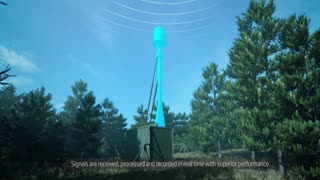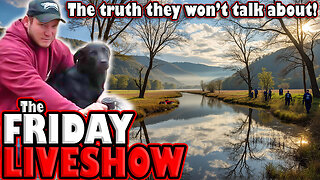Premium Only Content

Tangerine That's The Way Gallows Pole Led Zeppelin
Tangerine Album: Led Zeppelin III (1970)
That's The Way Album: Led Zeppelin III (1970)
Gallows Pole Album: Led Zeppelin III (1970)
by Led Zeppelin
Led Zeppelin III is the third studio album, released on 5 October 1970. It was recorded in three locations. Much of the work was done at Headley Grange, a country house, using the Rolling Stones Mobile Studio. Additional sessions were held at Island Studios and Olympic Studios in London. As with the prior album, the band eschewed the use of guest musicians, with all music performed by band members Robert Plant (vocals), Jimmy Page (guitars), John Paul Jones (bass, keyboards), and John Bonham (drums). The range of instruments played by the band was greatly enhanced on this album, with Jones especially emerging as a talented multi-instrumentalist, playing a wide range of keyboard and stringed instruments, including various synthesizers, mandolin and double bass, in addition to his usual bass guitar. As with prior albums, Page served as producer on the album, with mixing done by Andy Johns and Terry Manning.
The album was one of the most anticipated of 1970, and its shipping date was held up by the intricate inner sleeve design based around a volvelle, with numerous images visible through holes in the outer cover. It was an immediate commercial success upon release and topped the UK and US charts. Although many critics were initially confused over the change in musical style and gave the album a mixed response, Led Zeppelin III has since been acknowledged as representing an important milestone in the band's history and a turning point in their music.
By 1970, Led Zeppelin had achieved commercial success in both the UK and the US with their first two albums. They were determined to have a proper break, having recorded most of Led Zeppelin II in various locations while on tour, financing the sessions with the album sales and tour receipts. Following an exhausting concert tour of North America that spring, lead singer Robert Plant recommended to guitarist and producer Jimmy Page that they should retreat to Bron-Yr-Aur, an 18th-century cottage in Snowdonia, Wales, on a hilltop overlooking the Dyfi Valley, three miles (4.8 km) north of the market town Machynlleth. Plant had spent holidays there with his family.
This remote setting had no running water or electric power, which encouraged a slight change of musical direction for the band towards an emphasis on acoustic arrangements. Page later explained that the tranquillity of Bron-Yr-Aur stood in sharp contrast to the continual touring of 1969, affecting the overall tone of the songwriting and dominance of acoustic guitars.[6] His playing was influenced by folk guitarists Davey Graham and Bert Jansch, who regularly used alternative guitar tunings. Plant also recalled the band were "obsessed with change" and enjoyed listening to John Fahey. The band specifically wanted a change in direction, to show they could play any style of music they wanted.
Robert Plant would sometimes introduce Tangerine at concerts by saying: "This song is for our families and friends and people we've been close to. It's a song of love at its most innocent stages."
Jimmy Page wrote Tangerine and first recorded it when he was with still with The Yardbirds. This was the last Zeppelin song Page wrote without any input from Robert Plant. It's also the only track on Led Zeppelin III for which Plant didn't write the lyrics.
Jimmy Page played a pedal steel guitar on Tangerine. He told Guitar Player magazine in 1977: "On the first LP there's a pedal steel. I had never played steel before, but I just picked it up. There's a lot of things I do first time around that I haven't done before. In fact, I hadn't touched a pedal steel from the first album to the third. It's a bit of a pinch really from the things that Chuck Berry did. Nevertheless, it fits. I use pedal steel in 'Your Time Is Gonna Come.' It sounds like a slide or something. It's more out of tune on the first album because I hadn't got a kit to put it together."
Why does Tangerine fade to silence a few seconds in? Jimmy Page explained when previewing the song for Melody Maker in 1970: "That's commonly known as a false start. It was a tempo guide, and it seemed like a good idea to leave it in – at the time. I was trying to keep the tempo down a bit. I'm not so sure now it was a good idea. Everybody asks what the hell is going on."
Led Zeppelin played Tangerine during acoustic sets on their early tours.
Tangerine was used at the end of the 2000 movie Almost Famous in a scene where a bus drives away.
This was the second Zeppelin song named after a fruit. "The Lemon Song" was the first.
According to Jimmy Page, Tangerine was dedicated to Jackie DeShannon, who was his girlfriend when he wrote the song. DeShannon, a member of the Songwriting Hall of Fame, had hits as a singer with "What the World Needs Now Is Love" and "Put a Little Love in Your Heart."
Tangerine was recorded on April 4, 1968 at one of the last studio sessions for The Yardbirds, under the title "Knowing That I'm Losing You." This first version performed by The Yardbirds, featured music almost identical to "Tangerine" by Led Zeppelin, but with different lyrics (vocals by Keith Relf), and was never officially released. It was supposed to be included on the Cumular Limit compilation (which was released in 2000), together with other materials from the same sessions, but interestingly enough, Page vetoed the release of the song. Since then, the version from The Yardbirds has leaked onto the internet, and Page has been accused of ripping off a Yardbirds composition, simply changing the majority of the lyrics (probably initially written by Keith Relf) in order to avoid any problem with the other members of his previous group. This would explain his veto against the release of the original song. It is not easy to ascertain the above, as the remaining members of The Yardbirds haven't spoken about the subject so far.
As pointed out in Stephen Davis's Hammer of the Gods, That's The Way's lyrics reflected Robert Plant's views on ecology and environment.
Jimmy Page and Robert Plant wrote this in Wales on a retreat to the Bron-y-Aur cottage, where they wrote many of the songs on the album. They took a long walk with a guitar and tape recorder (yes, they carried a tape recorder on their hikes), sat down in a ravine, and wrote this.
One of the most mellow Zeppelin songs, That's The Way reflects the quiet countryside in Wales where it was written. It's not typical of the Led Zeppelin sound, but the band was always evolving. "It was not all blood and thunder," Plant told Dan Rather in 2018. "There was a delicacy about it too, and a lot of great craft."
That's The Way was the first song Led Zeppelin authorized for use on a film soundtrack. After seeing a rough cut of Cameron Crowe's Almost Famous in 2000, Page and Plant agreed to let him use some Zeppelin songs on it, but this is the only one that is on the soundtrack. Other Zeppelin songs in the movie are "Tangerine," "The Rain Song," "Bron-Y-Aur" and "Misty Mountain Hop."
The lyrics "I can't believe what people saying, you're gonna let your hair hang down, I'm satisfied to sit here working all day long, you're in the darker side of town" reflects the way Zeppelin was treated in their earlier days in America. In the south it was common for Zeppelin to receive death threats before concerts. When they walked into restaurants they were usually asked to leave, but not before being spit on or having a gun pointed at them for their long hair.
The original title of "That's The Way" was "The Boy Next Door".
According to Robert Plant, That's The Way was written 30 minutes before Page's daughter Scarlet was conceived.
"Gallows Pole" is based on an old blues song called "Gallis Pole," which was popularized by Leadbelly. The song is considered "traditional," meaning the author is unknown... so it's not stealin'...
Jimmy Page got the idea after hearing the version by the California folk singer Fred Gerlach. "Gallows Pole" is an updated arrangement of a traditional folk song called "The Maid Freed from the Gallows", inspired by a version recorded by Fred Gerlach.
Page explained when previewing the song for Melody Maker: "He was one of the first white people on Folkways records to get involved in Leadbelly. We have completely rearranged it and changed the verse. Robert wrote a set of new lyrics. That's John Paul Jones on mandolin and bass, and I'm playing the banjo, 6-string acoustic, 12-string and electric guitar. The bloke swinging on the gallows pole is saying wait for his relatives to arrive. The drumming builds nicely."
The lyrics are about a man trying to delay his hanging until his friends and family can rescue him. Although there are many versions of this song, Led Zeppelin's is unusual in that it ends with the hangman hanging the protagonist despite all of his bribes. Most other versions end with the hangman setting the protagonist free.
A similar folk song called "Slack Your Rope" was sung by an Arkansan named Jimmie Driftwood. He adapted the words from a fifteenth century British Ballad when any crime could be paid off with money right up to the last step of the gallows. In his version, the criminal is definitely a woman and her lover rides up and pays her fee. >>
This is the only Led Zeppelin song that features a banjo. Jimmy Page wrote it on a banjo he borrowed from John Paul Jones. He had never played the banjo before.
Jimmy Page and Robert Plant teamed up again to record this song for an MTV Unplugged set. It's featured on the The Very Best of MTV Unplugged album and the duo are listed simply as Page and Plant.
Jimmy Page has claimed Gallows Pole as his favorite song on Led Zeppelin III.
The band used some lyrics from Gallows Pole on their 1975 track "Trampled Underfoot."
This is a rare Led Zeppelin song that speeds up as it goes along, a technique Jimmy Page also used on "Stairway To Heaven."
In 1994, Page and Plant re-recorded Gallows Pole in Wales for their album No Quarter. On that version, Page played a hurdy-gurdy, an odd instrument resembling an organ grinder that sounds like a bagpipe.
Gallows Pole was performed only two or three times live in concert, in an electric-only version. However, a few verses of the song (especially the final one) were sometimes included in some medleys (for instance in "Communication Breakdown," or "Trampled Underfoot").
-
 8:42
8:42
Psychological operations
8 hours agoTwo Pairs Of Hands Cleaning My Gun Mark Knopfler
15 -
 LIVE
LIVE
The Jimmy Dore Show
3 hours agoBig Agriculture Aggressively Coming After RFK jr.! Trump Sentencing in NY Case Delayed!
15,926 watching -
 LIVE
LIVE
RaikenNight
6 hours ago $1.64 earnedPlaying Halo with the Boyz!!!!
251 watching -
 1:03:05
1:03:05
Exploring With Nug
9 hours agoA Mother's Fight for Justice: The Unanswered Questions About Her Son's Death
3.3K -

The Amber May Show
2 hours agoTruth Behind Russia's Nuclear Threat | Matt Gaetz Steps Down As A.G.
1.63K -
 LIVE
LIVE
Adamsgotgame
7 hours agoAim training 357hrs #GZW and more
284 watching -
 LIVE
LIVE
Meisters of Madness
3 hours agoDark Souls 3 - A Campaign Signed in Blood
94 watching -
 57:57
57:57
Candace Show Podcast
6 hours agoJamaica Finally Sent Us Kamala’s Father’s Birth Certificate | Candace Ep 109
93.4K263 -
 24:50
24:50
Misha Petrov
2 hours agoReacting to YOUR Experiences With Leftist MELTDOWNS Over Trump’s Victory
16.9K14 -
 15:33
15:33
Silver Dragons
3 hours agoBullion Dealer Reveals How to Avoid "INFLATION TAX" With Silver and Gold
11.2K2